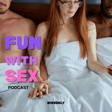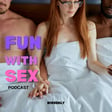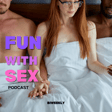Become a Creator today!Start creating today - Share your story with the world!
Start for free
00:00:00
00:00:01

The Hidden Bi Community (1-20)
In this episode of Fun with Sex, we're shining a spotlight on bi visibility! We'll explore the unique challenges and joys of identifying as bisexual, from navigating misconceptions to finding community in a world that often sees sexuality as either/or. Join us as we dive into the complex realities of being bi, tackle common stereotypes, and discuss the importance of celebrating bisexuality within both LGBTQ+ and straight spaces. Whether you're bi yourself or want to better understand bisexual experiences, this episode promises insight, laughter, and, of course, fun conversations about sex, love, and everything in between.
Recommended
Transcript
Introduction and Acknowledgment of Bi Visibility Week
00:00:00
funwithsexpodcast
Hi, welcome to the Fun with Sex podcast and Happy Bi Visibility Week to all my bisexuals. Hi, I'm Natalie. And I'm John. And this week we're talking about bi visibility. So I guess like the first thing we want to talk about is the fact that a lot of bi people aren't visible. Fun fact, the bi population is the largest population in the LGBTQ community with some studies estimating that bi people make up
00:00:31
funwithsexpodcast
almost sixty percent after by after lgbtq community yeah and fifteen percent of all gens z adults identifies bisexual. So there's a lot of bi people around. But if you ask a lot of people, do you know someone who's bisexual? A lot of people would say no, especially if you ask somebody if you know a bi man. Yeah, when I was researching for this podcast, I was really stunned by how many bi people there are in the population. And yet it's still so stigmatized.
Challenges Bisexuals Face in Professional Environments
00:01:05
funwithsexpodcast
Like, I remember
00:01:08
funwithsexpodcast
you know, reading some article about how a lot of people, if they report their bisexual to an employer, the employer is going to just assume they mean that they're like hypersexual. Um, so yeah, it, by visibility is important because this is a very large majority that is just historically underrepresented in every you know, media outlet, societal representation, conversation, whatever. So before we start talking about the big reason why there's not a lot of visibility and the fact that a lot of people who are bi aren't publicly identifying as bi, I do want to talk about why a lot of people who do publicly identify as bi aren't visible either.
Misjudgment of Sexual Orientation and Relationship Assumptions
00:01:59
funwithsexpodcast
So there's this expectation that when you see somebody, whether they're in a straight presenter relationship
00:02:06
funwithsexpodcast
or a gay presenter relationship the assumption is that person's either straight or gay or gay depending on the gender of the partner that they're and there's never the assumption of that but that person is bi, which statistically, if it is a queer relationship, the likelihood is that person's most likely going to be bi, certain that they're 60% of the LGBTQ community. Yeah, and I think that's kind of why visibility is so important, is that, you know, we have the data. There are a lot of bi people, but people just kind of
00:02:42
funwithsexpodcast
assume they're not around you're just if you're in a hetero passing relationship you're assumed to be straight if you're in a queer relationship you're assumed to be gay or lesbian and that's all there is to it i mean even if you look at like our relationship we're both two bi people but then when we go to queer spaces or straight spaces the assumption is that we're automatically straight people just assume that we're straight which is why i think that you get this thing with a lot of bi fans or bi cis women where they hyperperform their bisexuality and a lot of people take that as like, annoying that they tell everybody that they're bi. But no, they have to do that because if not, people don't assume that they're part of the queer community and people just ignore or don't see this very vital part of their
Visibility and Identity Challenges for Bi Men and Femmes
00:03:29
funwithsexpodcast
identity. So I think it's very important for like bi families to keep telling people that like, hey, I'm queer, I'm brown, I'm part of the bi community because it makes us more visible. The rally
00:03:40
funwithsexpodcast
we wish that by men would be more public and open about their identities because i think that like only two or to three percent of bi men our public about their identity? Yeah, I mean, you know, as a bi femme, I'm definitely the first to point out the annoyances that commonly come up with bi femmes. You know, like, I feel like so many people feel like they have to overcompensate in order to be considered queer. So they get into this really weird position where they're just like, if they're in a hetero passing relationship with a man, they're just like,
00:04:18
funwithsexpodcast
constantly putting him down like oh I just I just need to find a woman already I need to find a girl I'm not even really into men but you know it's like we all laugh at it from the outside but why do you think they're doing that so hardcore it's because like there's this expectation that if you're a bi femme, you're like not really bi and you're just doing it for men's attention. Yeah, your identity gets erased. So you hyper-perform your identity to make people know that like, no, this is who I am. It's the same reason why you get a lot of like biracial people who hyper-support the black community in all of their like content and what they're publicly facing. Because for so long, that part of their identity has been diminished or ignored. And like, I think there's a difference between hyper-performing queerness and
00:05:10
funwithsexpodcast
putting down your boyfriend. Cause I feel like a lot of times the bi fans who you do that are also the same bi fans who don't, who aren't as involved in the queer community. And part of the the reason why is because the queer community is not a as accepting of bi identities as it is of other identities, but also I think is because they're running in lot a lot of straight circles. So they have to tell all the straight friends that they're not actually straight. Yeah. I mean,
00:05:39
funwithsexpodcast
You know, I think it's also just like it manifests in like quite a few different ways. There's also a lot of bifems where they have to like talk shit about bifems to be accepted in sapphic circles and that sort of thing. um So yeah, I don't know if it's so much like, appeasing to straight women, because I don't know if straight women really quite care if you like, hate your boyfriend or not. I don't think it's appeasing. I think it's like letting straight people know that you're queer. But also again, my favorite part is also letting queer people know that you're queer. And I think that like, you perform for both and I think that's the reason why we need to have this podcast episode.
00:06:23
funwithsexpodcast
is that buy people who need healthier ways to show that they're visible I think as a bi woman, it's more, I see more of the bi femmes kind of overcompensating in queer circles. In straight circles, like, oh my God, if you have like colored hair, you're seen as like gay as fuck. Like, we don't need to like make ourselves seem any gayer to the straight girls. Like, if you've a pussy, they're like, oh my God, you're fucking gay. So it's more about like, you got these bi femmes and like,
00:06:58
funwithsexpodcast
here circles where they overcompensate with either self-deprecation or deprecation of like a partner. And the reality is that most bi families and bi mass people, cis people are in straight presenting relationships. I think it's like 80 doesn't estimate that 80% of bi Americans are in would be considered a cis heteronmer relationship if you look at it i mean that's what people see where they see us they see us straight says couple and that's the reality for most my people which also goes into the bi visibility, which makes it more important for bi people to be publicly out and identify, as to identity,
Media Misrepresentation and Its Real-life Consequences
00:07:37
funwithsexpodcast
to loved ones. But the sad reality is I think the status like less than a quarter of all bi people are public to someone who's important in their life or to all the people who are important in their lives. Yeah. And this is not just like being publicly bi all over your Instagram or at work or in every interaction. This is being public by
00:08:02
funwithsexpodcast
three quarters of my people arent Yeah, I mean... I think there's just so much misrepresentation and stereotypes. And that's what really holds people back because I can tell you as a bi woman, when I come out as bisexual and more like hetero circles, especially when you think of the older generation, I mean, the only people besides people who are like very invested in the queer community, but like in hetero circles that our parents grew up in,
00:08:36
funwithsexpodcast
who was the bisexual woman. She was probably this like crazy party girl who wanted to have a three-way and I was like the only bi representation they saw or something in a movie. So when they hear like, oh, my daughter's bisexual, they're like,
00:08:53
funwithsexpodcast
Oh my god, is she this like girl who's just like making out with everyone at parties and having three ways? Not that any of that stuff is shameful, but I was saying to a more conservative generation that would be. um Whereas with the bi male, it's like, well, what's the worst thing a man can be? It can be to be feminine in any way. And they're automatically perceived as less masculine,
00:09:22
funwithsexpodcast
not able to be in a masculine role, but they're they're assumed to pretty much be gay. The reality about bi-man is that so many people don't believe that bi, sexuality, and men have some core identity. They think that it's just a stop in being gay. But we also covered that in the earlier So if you're interested in that conversation, I will go check that out. But I do want to go back to it. It's like one of the reasons that we're going to get to later that Nat just brought up is that
00:09:53
funwithsexpodcast
of bi people in the media, because that is how bi people are presented. They're either presented as like very chaotic, normally not to shame anyone with mental health, or like bi characters are presented with some other mental health disorder. They're always presented to be crazy partiers, hyper sexualized. And reality is that that representation turns into real life violence. When you learn that bi women are more likely to be sexually or domestic and domestically abused and straight and lifes been
00:10:25
funwithsexpodcast
but name and the reason behind that is because a lot of cis men absorb that content about what bi women are supposed to be and then assume that all bi women are hypersexual and always promiscuous and always want sex. So then they take out these fantasies on real human beings and when they don't live up to these expectations they abuse them. Which is why again it's so important to have healthy and accurate representations of bi people who are just normal human beings who happen to be bi. The same way that the media has started portraying gay characters where
00:10:56
funwithsexpodcast
Everything else about them is quote unquote normal. They're just a human being who just happens to be gay. Yeah. When I think of media representation of bi people, particularly bi masks, I just always think of that awful season of love is blind. Basically this guy came out to this girl, you know, it's love is blind. So they met in the pods, didn't physically see each other.
00:11:25
funwithsexpodcast
And he didn't feel safe to come out as bisexual until they were actually engaged and had met face to face. Totally reasonable, right? And, you know, he comes out as bisexual. That was it. He just said, I'm bisexual. I've dated both men and women. This woman freaks out as if like he had announced he was basically like a serial cheater and was going to cheat on her with men.
00:11:54
funwithsexpodcast
So she flips the fuck out. She's swearing at him. She's like, you tricked me. She's basically acting like he hoodwinked her into like some terrible situation when it's like quite literally all he said is he is bi and he's dated both men and women and he just wanted her to know that about him. Um, and she freaks out and I just felt like the show didn't even handle it the right way. Cause then when they have the little reunion at the ending, of course she probably has a PR team by then. and So she's like, what? I'm not biphobic. I'm not homophobic. I was just upset that he didn't tell me that right away. It's like, come on girl, because in your head you have that stereotype that he's a bi man. So he's going to cheat on you with men and you're going to have to live your whole marriage with him.
00:12:48
funwithsexpodcast
chasing after gay men. And that's why we need so much more representation of bi people in healthier situations. Well, people reacting to people coming out as bi in healthier situations, because you know who sees that? Either the show itself or the TikTok versions, queer men, bi people who then say i'm not goingnna come on to my partner I'm not going to come out as bi because I don't love that type of reaction. I mean, there is a lot of men who talk about it when they put that their bisexual and dating apps in their bios, their rates are not just going down significantly. And which is why also because people see, since women see the bi representation of queer men in the media and they say, hey, I don't want to date this guy because bi men are always portrayed portrayed to be cheating and they have to be a stop along the way to being gay.
00:13:40
funwithsexpodcast
I think that like going back to like the conversation that we were having having earlier is that I think that there's a big reason why a lot of my people don't go out. I mean, come out and why 80% of my people are in straight presenting relationship. And I think the word is heteronormativity. Yeah, I think that the streamline of straightness is straight culture makes it so easy for my people to just live their life as a straight person without ever coming out as buy and your public identity
00:14:12
funwithsexpodcast
because you do have that option that gay people don't have where you can fall in love with somebody of a different gender and present very straight and live a happy life for the most part.
Realization of Bisexuality and Societal Programming
00:14:25
funwithsexpodcast
Yeah, I totally think that's it.
00:14:28
funwithsexpodcast
um you know, it's, we're just in the society but program to envision our future a certain way. That's definitely what happened to me. I didn't even realize that girls could be gay too, because I had only seen representation of gay men in my life. So, you know, when you don't have a visualization of what the possibility is, you're just not going to think of it. And it's pretty,
00:14:56
funwithsexpodcast
hard to deny your sexuality when the only gender you're attracted to is the same one as yours. yeah But it's so easy to deny your sexuality if you do experience very real, very strong attraction to a different gender than yours. It's really easy to push it aside and be like,
00:15:17
funwithsexpodcast
Yeah, you know, I kissed her, but there wasn't any meaning behind that. And, you know, I'm, I'm dating this person and then you date a while and then you get married and so on and so on. And that's how you end up having these 35 year olds who are like, oh my God, I'm bi. And that's the reality is that bi people statistically are more likely to come out later in life than gay or straight people. And I think that, again, that goes down to the stream of heteronormality,
00:15:46
funwithsexpodcast
had a relativity. There was a TikToker who explained it this way. Imagine you're a salmon and straight salmons can just flow society. They can just flow with the river. Salmon who are 100% gay or have a stronger preference for the same gender, their identity naturally goes against the current. So they are programmed to swim against the current.
00:16:12
funwithsexpodcast
but if you're bisexual and you can ble in with the current and just go the way the society tell you to go it's a lot easier to just do that and that's what happens for a lot of bi people is that you may feel attraction to multiple genders but if you can repress one gender and feel quote-unquote normal or present quote-unquote straight and it it makes your life easier you don't have to have to have conversations with families and friends a lot of people just choose to go with the current to go with the flow.
Gen Z's Sexual Fluidity and Stigma Against Labels
00:16:42
funwithsexpodcast
Yeah totally. Yeah so I guess the other thing that we need to talk about is
00:16:48
funwithsexpodcast
Oh, the reality of that, there's a lot of bi people. We talked about the 60% number in the queer community, but I have a really interesting study. So, ah I don't know if you know this, a 2016 UK study by YouGov found out that 40% of participants who are Gen Z adults between the age of ages of 18 and 24,
00:17:16
funwithsexpodcast
didn't identify that's completely straight or gay yeah And then in 2019, that study was replicated in three different countries. And again, over a third of all Gen Z adults don't identify as completely straight or gay. But then when you ask them, do you identify as bisexual? A lot of times that number falls to about around 15. But there's a lot of people who don't identify as completely straight or gay.
00:17:44
funwithsexpodcast
but they also don't want to use the label bisexual why do you think that is I think for one thing, there's not a lot of good education on the fact that bisexuality is a spectrum. So I think a lot of people where they were like a one or two or, or sorry, two or three or an eight or nine on the Kinsey scale. It would be a one or two or a four or five. Oh, okay. They're kind of like, Oh, you know,
00:18:15
funwithsexpodcast
I don't, I don't really think I count as bi because it's not like an even split. So I think that definitely has a factor. I think the normalization of your community as well, because you know, if you've always had straight friends, you're going to feel more inclined to just like you said, go with the current and identify as straight. But the same thing happens to people who grew up in spaces where like queerness was more normalized, you know, they come out pretty early in life as gay or lesbian. And they're like, okay, this is who I am. And then they grow up in these communities where bisexuality still isn't very represented. And they're kind of like, you know, later in life, like, oh, shoot, maybe I am bi. And then I also just think it's the stigma of it all.
00:19:08
funwithsexpodcast
Like I said, I saw that study, I wish I remembered where it was from, but employers responded that if they had, you know, if they had somebody reported their identity as straight, fine, of course that's accepted. If somebody said gay or lesbian, it was, you know, things are a bit more in touch and progressive now. So like a good chunk of people were like, yes, that wouldn't bother me. But when people put bisexual,
00:19:37
funwithsexpodcast
all of a sudden it spikes up and employers see that as a red flag because to a lot of people saying you're bisexual is the same thing as being like, I want a threesome. Yeah. I'm a horned up motherfucker. That thing wants a threesome and wants to fuck everyone. Or if you're in monogamous, like they think that you're just a serial cheater. So yeah, I think for a lot of people, it's just easier. I mean, even think of being in gay man circles, like,
00:20:07
funwithsexpodcast
there's so much misogyny in those circles. So in a lot of those circles, if you're a bi guy and you're hanging out with your group of gay male friends, if you say something like, yeah, I just started talking to this girl, they may be like, Oh my
Loneliness and Exclusion in Queer Circles
00:20:25
funwithsexpodcast
God. And they wouldn't really engage with you in like a healthy conversation in the same way they would if you said you were talking to a new guy.
00:20:35
funwithsexpodcast
And it's the same thing in straight circles where it's like, you know, if you're talking to a girl, like your straight friends aren't really like going to assume it's a relationship. They assume it's just some hookup or fling. So it's just easier to not say things. Yeah. And that's the thing that I think a lot of people realize about the bisexuality being a spectrum. And again, there's two ways that we normally measure bisexuality.
00:21:02
funwithsexpodcast
There's the Kinsey Scale that Natalie was getting at before, which is a way to, it's not even a way to judge identity, it's a way to rate your sexual behavior. But as we interpret it now, people are using the gesture identity. But originally the Kinsey Scale goes from zero to six with zero meaning that you've only had sexual behavior with people of the opposite gender. We also understand that there's more than two genders.
00:21:28
funwithsexpodcast
And six being that you only have sexual relationships with people of the same gender as you. And everything from 0.1 through 5.99 is bisexuality. And the reality is that a lot of times people who identify as say a one where they've almost entirely done stuff with people of different genders or people being a five or they're entirely done stuff with people of the same gender, they're probably untilt going to identify as straight or danny.
00:21:59
funwithsexpodcast
for all the reasons that you've mentioned before, because you form a community, you form an identity being a straight or gay person, and then you have to behave that as being a bi person. Even probably a lot of people who are closer to two or fours, or even people I've talked to who are like, would be a three on the Kensey scale, even choose to just identify a straight or gay because it's easier, those communities are more visible, you can find representation,
00:22:28
funwithsexpodcast
you can find a culture that for a lot of times bisexual people don't have. And I think that that stress is why bi people struggle to find a community and multiple studies found that bi people are the second loneliest group in America after trans people. Bi people struggle with higher rates of anxiety, depression, and loneliness than cis straight or gay people.
00:22:54
funwithsexpodcast
Yeah, because they just, you know, you don't fit into either group. You don't fully relate to straight people and their experiences. But it's also like speaking from personal experience, it's really hard being in more queer circles too. There's a lot of lesbians. First of all, there's a lot of lesbians that won't even date bi girls. Second, there's kind of there's another group of people, maybe the same, where they kind of project that bisexual is some kind of questioning phase where it's like, oh, you know, you'll be a lesbian soon enough. um I think especially as we get into this day and age too, where there's more choice lesbians by women who choose to be lesbian. And I think that's a big influence on it, especially when it intersects with
00:23:49
funwithsexpodcast
more modern takes on feminism as well like you're kind of seen as lesser than if you're still dating men and that's like back to my point with like where the self-deprecation comes from like if you you know pull up to a wine night full of like queer women who aren't bisexual like there's gonna be some judgment when you talk about your boyfriend and there's gonna be some like Judgment of him too, and you know you're kind of assumed to be like this girl who hasn't like elevated past Doing that like oh, she's still dating man.
Conclusion on Bisexuality Visibility and Challenges
00:24:30
funwithsexpodcast
She's still figuring it out Yeah, I actually have nothing else to add to this conversation. I think you're gonna do that there I gotta offer and I wanted to say anything else you want to add in nope All right, cool. Thank you for this conversation
00:24:45
funwithsexpodcast
this has been the fun of sex podcast a nice stay




